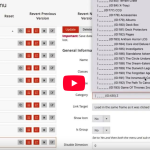
March 17,2023
Top 5 ecommerce platforms
If you’re looking to launch a successful ecommerce business, having the right ecommerce platform is key. This article highlights the top 5 ecommerce platforms available, and looks into what makes a good ecommerce platform.
What makes a good ecommerce platform?
Performance and Security
For customers, page speed and performance of an online store matter more than ever before, especially when you take into consideration that most users will wait no more than 3 seconds for a page to load before abandoning it. That’s why it’s important to select an ecommerce platform that is both reliable and fast in loading pages.
If a potential customer has to wait too long after clicking on something while shopping in your store, they won’t stick around. Therefore make sure that your chosen platform runs smoothly and quickly when it comes to loading pages, transactions and more.
It’s also important to weigh up security options available with each potential choice of platform. Without added security you risk losing data or getting hacked, this is why a website’s security can be the make or break between how successful a website will be.
Support & Maintenance
Good technical support is essential when starting up an ecommerce business, as there are many issues that may arise. Make sure that the selected platform offers great customer service along with updates regarding maintenance work and bug fixes. It’s also worth bearing in mind that some platforms offer support 24/7.
Flexibility & Versatility
The flexibility of an ecommerce platform should be considered when picking one; this will allow you to determine the design or interface of your store according to the needs of your target audience without worrying about compatibility issues with existing infrastructure restraints on certain platforms.
As well as this, there are also the features the ecommerce platform offers and their flexibility. How versatile the discount options are, which payment gateways the system integrates with are just a few ideas of what goes into making a good ecommerce system.
Shopify
Shopify is one of the most popular ecommerce platforms. Shopify is a subscription based platform that is designed to be user friendly, creating ease for their clients. Shopify is designed to be easy to use, being considered as ‘beginner friendly’. Furthermore, operating an online shop on Shopify with its ability to integrate with other social media platforms, such as Instagram and Tiktok, will provide your business with more exposure beyond just the Shopify store itself.
Pros:
Customer support
Most websites will hit a wall at some point in their life. Because of this, Shopify have ensured that their customers will get 24/7 support, whom their customers can get in touch with in a variety of different ways, offering email, live chat, an FAQ section and a hotline that people can phone.
Hosting and Security
Shopify is a fully hosted platform. By using Shopify customers don’t have to worry about paying extra costs for hosting. Furthermore, Shopify requires less effort to keep your CMS safe, this is because updates are automatically applied. The only thing you will need to update will be any plugins or applications.
Cons:
Email Hosting
Unlike other platforms, Shopify does not offer email hosting. This means that you may have to find alternative providers to set up your stores email address. While this is a relatively easy process, the issue lies with the cost. One study found that ‘Google email hosting will cost around £10 per month to host an email address that includes @yourdomain.’
Pricing
While Shopify offers a range of different plans, a shopify subscription may prove costly for small businesses. Offering a free 14 day trial is an added benefit, however, after the trial is over it is up to the customer to choose their plan. There lies the issues of the cheaper plans having limited features, you may miss out on key features that you would elevate your store
Furthermore, many of the extensions, apps and plugins require an additional monthly cost, meaning you can end up paying more than the starting Shopify package you chose.
Magento
Magento is an ecommerce platform that specialises in ecommerce websites. Owned by Adobe, Magento gives its users more control over the look and functionality of its websites. While Magento can be used by different customers whether big or small, the bigger a company is the more complex the Magento system becomes.
Pros:
Open Source
Magento is an open source platform. This means that you can alter the code to suit your website’s preferences. This means that you can easily change the appearance or functionality of the website. Generally, Magento websites are designed and developed by professionals, however as it is open source, once you have the website it is yours to do what you wish with it.
Marketing
Magento offers key areas of SEO , which includes all of the title tags and meta descriptions. Ultimately, Magento offers great control and range to Marketing and SEO.
Functionality
Magento comes with a range of in-built functionality, including flexible product types, allowing you to add products in different ways, in-built reporting that covers products, sales and more. It also has some fairly in depth discount functionality that allows you to get creative with the types of offers you want to have.
Cons:
Cost
While Magento doesn’t cost anything as it is a free open source. You will still need to pay for designers and developers to create the website. In addition to this, you will also need to pay for hosting. All of which will vary depending on the scale of the website. Average low running costs can gradually add up to around £800 per month for hosting and support.
Woocommerce
Woocommerce is a plugin that’s run through the CMS WordPress. Woocommerce makes it easy to build an online store, with their ‘beginner friendly interface’, it is one of the top choices for businesses.
Pros:
Flexibility and customisation
WooCommerce offers an amazing level of flexibility in product customization and design options, so it’s easy to make your store stand out from the competition. Offering plenty of themes for customers to choose from.
Additionally, because WordPress is one of the most popular content management systems on the webs, there are a vast range of plugins and add ons that can be added to further enhance the website.
Security
Due to its popularity, Woocommerce is updated by its developers regularly. It also offers secure payments options such as Stripe and Paypal. Furthermore, one study notes that for an added layer of security, you can add security plugins that will regularly scan your website for malware.
Cons:
WordPress Restrictions
Unlike Magento and Shopify, Woocommerce is reliant (not independent) on having a WordPress website. This is because Woocommerce is a wordpress plugin, meaning you are reliant on how WordPress is built and functions
Expenses
Woocommerce is free to download, and offers monthly payments for the basic features. However beyond these functions is where additional expenses occur. These can cost an additional £200 per year, and upward depending on the scale of the website.
Security
While Woocommerce is updated regularly to ensure it remains secure, it is worth noting that because of its popularity Woocommerce is generally more likely to be targeted by hackers. One study found that ‘This content management system is reported to be less secure and more vulnerable to hackers’.
Bigcommerce
Bigcommerce is a hosted ecommerce platform that allows you to build an online store quickly and easily. The platform offers a range of features, including mobile optimization, product categorization, abandoned cart recovery and more. It also provides hosting services, meaning you don’t need to worry about setting up or managing your own servers for your website.
Pros:
Flexibility
Bigcommerce is ideal for both big and small businesses. With almost no limit on the product variants you can create. Furthermore, Bigcommerce offers a variety of features which can save money you would otherwise spend using other ecommerce platforms.
Furthermore, with this flexibility comes a lot of customisation features that are optimised for various different devices.
Customer Support
Bigcommerce offers 24/7 customer support. You can chat to their team about any issues that may occur. With their live chat support, emails, phone calls and help centre that includes useful videos.
SEO Benefits
One study found that ‘Bigcommerce SEO features make the continuous optimisation process simpler’, it does so by each individual page being built with HTML elements, optimised URLS, rewrites and redirects, which ensures that any errors that may occur are catered for.
Furthermore, ‘BigCommerce’s software has a response time of ⅓ of a second and an average uptime of 99.99% compared to the industry average of 99.5% and Shopify’s 99.98%.’, While this may not seem like too much of a difference, this ensures that your site is less likely to go down throughout the year.
Cons:
Expensive
Bigcommerce is more expensive than some of the previous platforms mentioned, with their monthly prices starting at £39/per month, this is very expensive for small businesses. Especially when you consider that on the standard plan 2.9% is taken off the top of each sale.
Bigcommerce is designed to help your business continue to grow, which is why before you commit to some of the more expensive plans, it is worth considering whether your business is already in a position to excel.
Additionally, while bigcommerce is great for customisation, many of the themes are not free and can range from up from £145.
Open Cart
OpenCart is a popular ecommerce platform that enables businesses to create online stores easily. It’s an open-source platform that supports a wide range of customers, including small, medium and large companies.
Pros:
Scalable & Secure
OpenCart is highly scalable meaning that it can handle high volumes of traffic without any issues. It also comes with advanced security features such as encryption algorithms and two-factor authentication which keeps your customers’ data safe and secure at all times. Additionally, OpenCart supports numerous payment gateways making it easier for customers to purchase products from your store regardless of where they’re located in the world.
Customisation
OpenCart allows you to customise a variety of features for your store including design elements and functionality. Additionally, there are hundreds of free and paid themes available which can be used to completely customise your store’s appearance.
Cons:
User Experience
OpenCart does not provide users with the most intuitive experience compared to other ecommerce platforms like Shopify or Bigcommerce . It is often difficult for nontechnical people to navigate through the back end system without help from an expert who understands how it works.
Conclusion
When it comes to choosing an ecommerce platform there are a lot of different areas to consider, whether that’s the platform’s security, and performance or whether it simply depends on your budget! Check through the many areas and consider how these may impact your business. We recommend you look into the different features that each platform offers and consider the impact each area may have on your business – whether that be a pro or a con.




